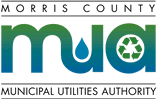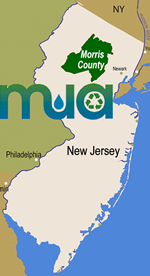Transfer Station Info (Tip Fee $111.25/ton)
- Mt. Olive Mon-Fri 7:30am-3pm; Sat 7:30am-11am
- Parsippany Mon-Fri 7am-3pm; Sat 7:30am-11am
- Closed Sundays and Major Holidays
- No Rental Trucks
- Payment by Account, Check, Credit Card. No Cash

Morris County
Municipal Utilties Authority
Transfer Station Info (Tip Fee $111.25/ton)
- Mt. Olive Mon-Fri 7:30am-3pm; Sat 7:30am-11am
- Parsippany Mon-Fri 7am-3pm; Sat 7:30am-11am
- Closed Sundays and Major Holidays
- No Rental Trucks
- Payment by Account, Check, Credit Card. No Cash
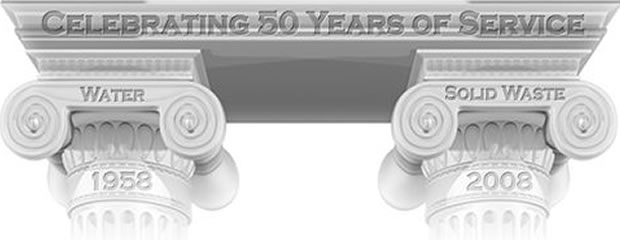
The Golden Age of Recycling
The 21st Annual Morris County Recycling Awards Dinner
Friday, November 7, 2008
Hanover Manor, East Hanover, NJ 07936
Mistress of Ceremonies
Penny Jones
Morris County Recycling Education Specialist
Welcome
William Hudzik, Chairman, Morris County Municipal Utilities Authority
Fashion Show and Commentary
Liz Sweedy, Morris County Recycling Specialist
Presentation of Awards
- Glenn Schweizer, Executive Director, MCMUA
- Kathleen Hourihan, District Recycling Coordinator, MCMUA
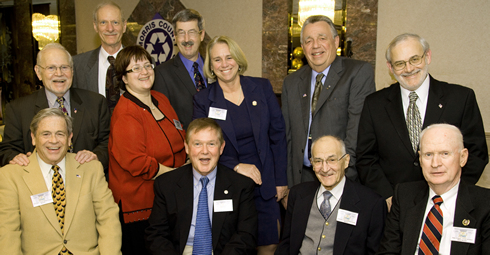 MCMUA
Celebrating 50 Years of Service
MCMUA
Celebrating 50 Years of Service
2008 and this year's recycling awards dinner commemorated the MCMUA's 50 year anniversary by
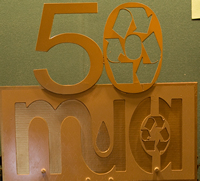 recognizing all the MCMUA Board members that have served on the MCMUA
since its beginning in 1958. Four retired MCMUA Board members
attended the dinner while seven current Board members also attended the
gala. The MCMUA is proud to pay tribute to all those individuals
that gave their, time and energy to make the MCMUA what it is today.
recognizing all the MCMUA Board members that have served on the MCMUA
since its beginning in 1958. Four retired MCMUA Board members
attended the dinner while seven current Board members also attended the
gala. The MCMUA is proud to pay tribute to all those individuals
that gave their, time and energy to make the MCMUA what it is today.
And the awards go to…
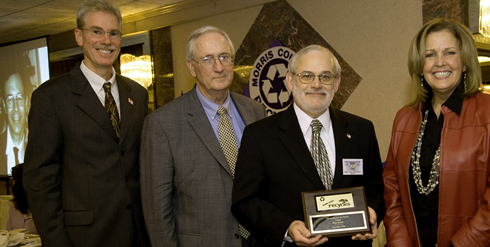 Counseling for the Plan-It Award – Ron Kevitz
Counseling for the Plan-It Award – Ron Kevitz
During the era that preceded the Golden Age of Recycling, Ron Kevitz was a key player in drafting the Morris County Solid Waste Management Plan. Ron applied considerable
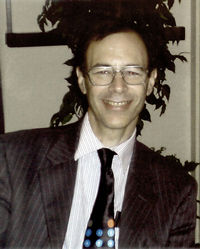 legal expertise as he worked with the Morris County Board of Chosen
Freeholders, Solid Waste Advisory Council and staff to develop and
defend the provisions of the county’s plan. This involved executing the
difficult and tumultuous tasks of conducting landfill and
waste-to-energy siting studies, and dealing with the New Jersey
Department of Environmental Protection. When he served as Morris County
counsel, Ron ably advised the county as it included provisions for
mandatory recycling in the county plan prior to April 1987, when
recycling was mandated for the entire state of New Jersey.
legal expertise as he worked with the Morris County Board of Chosen
Freeholders, Solid Waste Advisory Council and staff to develop and
defend the provisions of the county’s plan. This involved executing the
difficult and tumultuous tasks of conducting landfill and
waste-to-energy siting studies, and dealing with the New Jersey
Department of Environmental Protection. When he served as Morris County
counsel, Ron ably advised the county as it included provisions for
mandatory recycling in the county plan prior to April 1987, when
recycling was mandated for the entire state of New Jersey.
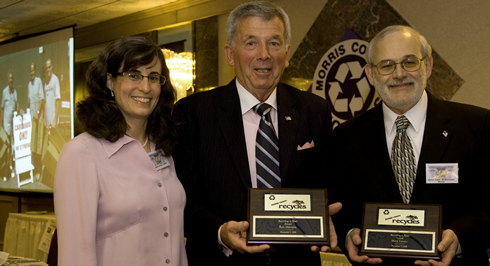 Recycling is Neat! Award – Mark Lavery and Ron Matusiak - Known as “the
dynamic duo,” part-time employees Mark and Ron make a huge contribution
as they maintain order at the East Hanover Recycling Center. Mark, a
Recycling is Neat! Award – Mark Lavery and Ron Matusiak - Known as “the
dynamic duo,” part-time employees Mark and Ron make a huge contribution
as they maintain order at the East Hanover Recycling Center. Mark, a
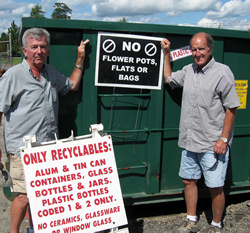 congenial greeter, diligently oversees the corrugated cardboard
compactor and the various roll-off containers to be sure that only the
proper material goes into them. He also ferrets through used clothing
that’s deposited at the center and gives the best to a local woman who
sends it to Poland. Ron, a former marine with a droll sense of humor,
is vigilant about keeping plastic bags out of the containers, for they
wreak havoc with the equipment used to process recyclables. On his own
initiative, Ron distributes flyers related to topics such as proper
disposal of household hazardous waste, and he strongly encourages
residents to recycle scrap metal. In the spirit of “One person’s trash
is another’s treasure,” both men have removed various items such as
tables, chairs and toys from the bulky waste disposal pile and set them
aside to give to someone to reuse.
congenial greeter, diligently oversees the corrugated cardboard
compactor and the various roll-off containers to be sure that only the
proper material goes into them. He also ferrets through used clothing
that’s deposited at the center and gives the best to a local woman who
sends it to Poland. Ron, a former marine with a droll sense of humor,
is vigilant about keeping plastic bags out of the containers, for they
wreak havoc with the equipment used to process recyclables. On his own
initiative, Ron distributes flyers related to topics such as proper
disposal of household hazardous waste, and he strongly encourages
residents to recycle scrap metal. In the spirit of “One person’s trash
is another’s treasure,” both men have removed various items such as
tables, chairs and toys from the bulky waste disposal pile and set them
aside to give to someone to reuse.
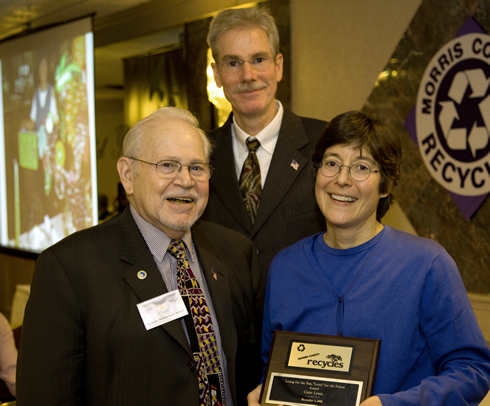 Living for the Past, “Levin” for the Future – Carie Levin
Living for the Past, “Levin” for the Future – Carie Levin
Carie Levin has two homes: Acorn Hall in Morristown, an Italianate Victorian mansion built in 1853, current headquarters of the Morris County Historical Society, and an apartment in Morristown. “I get a kick out of the fact we’re recycling at home and at the ‘other home,’” Carie said
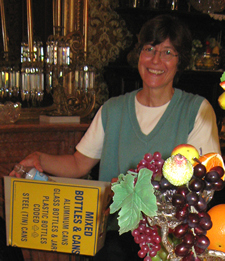 as she reflected on her strong convictions about recycling. Imbued with
tenacity, Carie worked with both the management company for her
apartment complex and Morris County Municipal Utilities Authority
(MCMUA) staff to institute recycling. At Acorn Hall, her “other home,”
where she serves as education coordinator for the historical society,
Carie was equally tenacious. As a result, in the midst of the frilly
Victorian paraphernalia, there is a simple recycling setup. Carie has
trained her co-workers to recycle properly, continues to answer queries
such as “Is this recyclable?” and happily responds to being called the
“Trash Police.”
as she reflected on her strong convictions about recycling. Imbued with
tenacity, Carie worked with both the management company for her
apartment complex and Morris County Municipal Utilities Authority
(MCMUA) staff to institute recycling. At Acorn Hall, her “other home,”
where she serves as education coordinator for the historical society,
Carie was equally tenacious. As a result, in the midst of the frilly
Victorian paraphernalia, there is a simple recycling setup. Carie has
trained her co-workers to recycle properly, continues to answer queries
such as “Is this recyclable?” and happily responds to being called the
“Trash Police.”
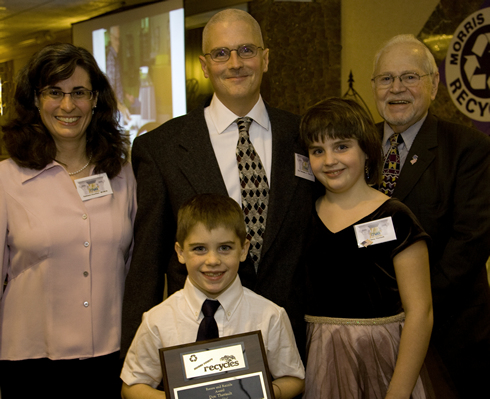 Renew and Recycle Award – Don Theriault
Renew and Recycle Award – Don Theriault
In the olden days when he worked at Prudential, Don contacted the MCMUA to request assistance with disposing properly of fluorescent bulbs. After acquiring the title of lettershop manager for Fulco Inc. in Denville, a small company involved in “magazine fulfillment, ” Don again contacted the MCMUA to ask for help with recycling paper, bottles and cans. By the way, Don says all of the
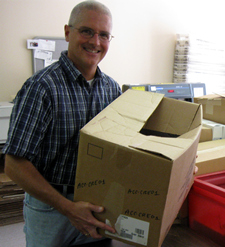 following tasks are related to “magazine fulfillment”: sending labels
to printers; sending renewal letters, bills and invoices for 80
publications to subscribers; sending magazines to subscribers who didn’t
receive specific issues; and sending back issues of magazines (Fulco
keeps back issues in stock for 24 months). Because of Don’s efforts,
Fulco contracted with the MCMUA for once-a-week collection of bottles
and cans, and the large quantities of paper it generates. In his very
hands-on way of tackling recycling, Don always requests make-up
collections when holidays occur on regularly scheduled collection days.
And he’s quite proud of being a good recycler at home!
following tasks are related to “magazine fulfillment”: sending labels
to printers; sending renewal letters, bills and invoices for 80
publications to subscribers; sending magazines to subscribers who didn’t
receive specific issues; and sending back issues of magazines (Fulco
keeps back issues in stock for 24 months). Because of Don’s efforts,
Fulco contracted with the MCMUA for once-a-week collection of bottles
and cans, and the large quantities of paper it generates. In his very
hands-on way of tackling recycling, Don always requests make-up
collections when holidays occur on regularly scheduled collection days.
And he’s quite proud of being a good recycler at home!
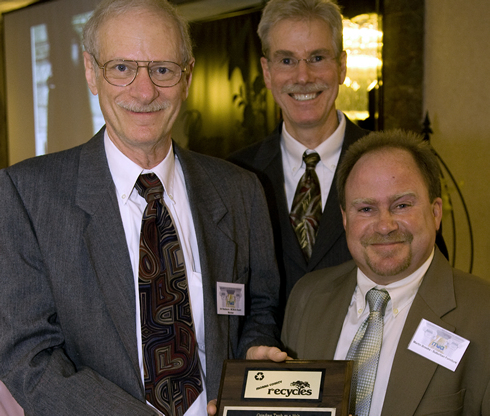 Grinding Trash to a Halt Award - Martin Brooks
Grinding Trash to a Halt Award - Martin Brooks
“We used to have bi-weekly trash collection, but now we have it about once every ten weeks,” said Martin Brooks, operations manager at the Suburban Furniture and Mattress warehouse in Randolph. Hired three years ago to move the store’s operations from Netcong, Martin noticed that solid waste disposal costs were “out of sight.” He applied lots of elbow grease, and the result has been a 50% reduction of solid waste. For non-recyclable solid waste
 (trash), Suburban uses an augur compactor
that grinds trash up, thus saving space in the roll-off container. In
addition to recycling corrugated cardboard, bottles and cans, and scrap
metal, Martin recycles used mattresses and box springs that have been
replaced with new ones (he fills a 28-foot straight truck every month
and a half). He also delivers 500 pounds of polystyrene and some
pallets to Foam Pack Industries in Springfield, N.J., and backhauls
recyclables from Foam Pack to a recycling vendor in Morris County. The
polystyrene is put into plastic bags that were originally on new
furniture delivered to the warehouse. “I feel great when I see a truck
loaded with polystyrene about to leave from Foam Pack,” Martin
remarked. He also makes sure that any furniture with reuse potential
finds a home, and often that home is a non-profit agency, such as the
Morris Habitat for Humanity ReStore. One thing is for sure: Martin
Brooks is on the go; he has no time to relax in any of the comfy lounge
chairs at the warehouse!
(trash), Suburban uses an augur compactor
that grinds trash up, thus saving space in the roll-off container. In
addition to recycling corrugated cardboard, bottles and cans, and scrap
metal, Martin recycles used mattresses and box springs that have been
replaced with new ones (he fills a 28-foot straight truck every month
and a half). He also delivers 500 pounds of polystyrene and some
pallets to Foam Pack Industries in Springfield, N.J., and backhauls
recyclables from Foam Pack to a recycling vendor in Morris County. The
polystyrene is put into plastic bags that were originally on new
furniture delivered to the warehouse. “I feel great when I see a truck
loaded with polystyrene about to leave from Foam Pack,” Martin
remarked. He also makes sure that any furniture with reuse potential
finds a home, and often that home is a non-profit agency, such as the
Morris Habitat for Humanity ReStore. One thing is for sure: Martin
Brooks is on the go; he has no time to relax in any of the comfy lounge
chairs at the warehouse!
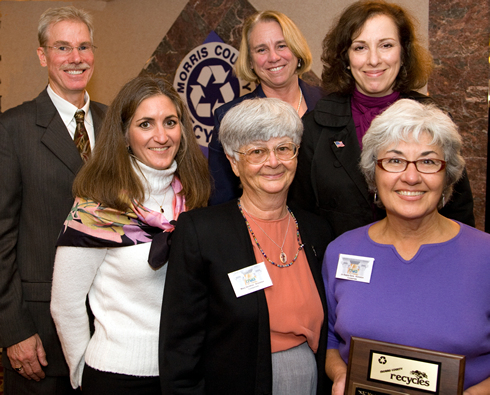 “N.E.” Morris County Conservation is Good Conservation Award – Kinnelon
Conserves
“N.E.” Morris County Conservation is Good Conservation Award – Kinnelon
Conserves
Directly from the Kinnelon Conserves Web site: “Kinnelon Conserves is a grassroots environmental education initiative designed to boost environmental awareness. Through programs, communication and events, we encourage residents of all ages to learn about sustainable, Earth-friendly living, and to share what they learn with others.” Indeed, Kinnelon Conserves volunteers have participated
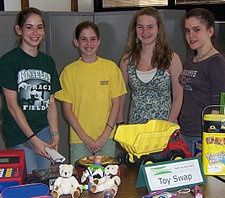 in nine public events during the past year and a half, at which they
asked participants to sign an informal pledge called The 1000 TON
Challenge: “I pledge to become more aware about my use of energy and
natural resources. I will do my best to replace wasteful habits with
wise ones, to conserve energy and natural resources, and take action to
prevent 5000 pounds of unnecessary pollution.” Accompanying this pledge
is a list of ways to save money and energy; the second entry on the list
touts the virtues of recycling ALL paper, aluminum and plastic (#1 and
#2). Avery Hart and a group of other dedicated volunteers have created
a Web site with pages devoted to recycling, conservation, and available
resources. To top off the whole project, they promote this idea: Let’s
have fun as we learn together.
in nine public events during the past year and a half, at which they
asked participants to sign an informal pledge called The 1000 TON
Challenge: “I pledge to become more aware about my use of energy and
natural resources. I will do my best to replace wasteful habits with
wise ones, to conserve energy and natural resources, and take action to
prevent 5000 pounds of unnecessary pollution.” Accompanying this pledge
is a list of ways to save money and energy; the second entry on the list
touts the virtues of recycling ALL paper, aluminum and plastic (#1 and
#2). Avery Hart and a group of other dedicated volunteers have created
a Web site with pages devoted to recycling, conservation, and available
resources. To top off the whole project, they promote this idea: Let’s
have fun as we learn together.
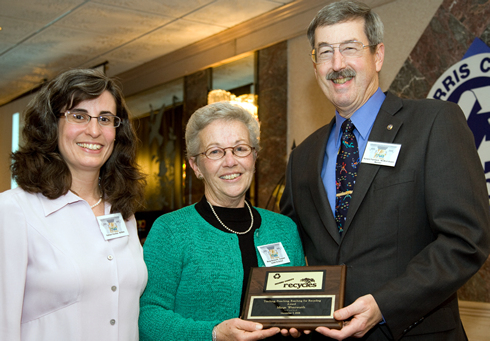 Teaching, Preaching and Reaching for Recycling – Marge Wentworth
Teaching, Preaching and Reaching for Recycling – Marge Wentworth
Marge, a teacher at the Gingham Giraffe Preschool in Chatham Township encouraged her colleagues at the first staff meeting of the 2007-2008 school year to “go green” in their daily activities. Afterward, she took the bull by the horns and established a school-wide recycling program. Marge supplied and placed properly labeled
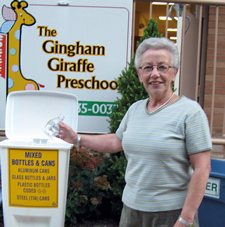 containers in convenient locations throughout the school, trained her
fellow teachers to recycle correctly (one teacher said the mantra became
“What would Marge do?”), and lugged recycling containers outdoors to
empty them. Through her teaching and actions, Marge also planted seeds
of knowledge about recycling in the minds of the two-and-a-half to
five-year-olds who attend the school. Hopefully, they, along with their
teachers will leave carbon fingerprints,
rather than footprints, on planet Earth as time goes on. Marge’s
“recycling fever” and enthusiasm have infected everyone at the school,
and she too, has a special moniker: “Commissioner of Recycling.”
containers in convenient locations throughout the school, trained her
fellow teachers to recycle correctly (one teacher said the mantra became
“What would Marge do?”), and lugged recycling containers outdoors to
empty them. Through her teaching and actions, Marge also planted seeds
of knowledge about recycling in the minds of the two-and-a-half to
five-year-olds who attend the school. Hopefully, they, along with their
teachers will leave carbon fingerprints,
rather than footprints, on planet Earth as time goes on. Marge’s
“recycling fever” and enthusiasm have infected everyone at the school,
and she too, has a special moniker: “Commissioner of Recycling.”
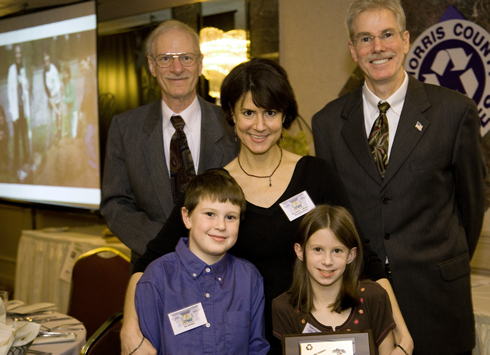 The “Write” Angle on the Environment Award – Pam Altman
The “Write” Angle on the Environment Award – Pam Altman
A member of the Jefferson School Environmental Committee, Pam Altman has devoted countless hours to make sure the inhabitants of the pre-K-grade 4 school in Roxbury are respecting Mother Earth. She was instrumental in getting the recycling program up to snuff. She made arrangements for several environmentally related assemblies to be presented. Her suggestion that the science fair focus on environmentalism was taken to heart; the theme was “Conservation in Daily Life.” She was involved with a project through which students sent environmental tips to
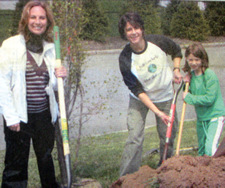 Principal Karen Carlson; many of those tips were read by fourth graders
on the public address system near Earth Day. Pam also coordinated “No
Child Left Inside Day,” which was celebrated on April 30. On that day,
students and parents planted flowering dogwood trees and maple trees on
school property. Also, Pam wrote “Eco-Action” articles for the
school’s monthly newsletter, the topics of which were saving paper;
conserving water; saving energy; reducing, reusing and recycling; and
the advantages of replacing incandescent light bulbs with compact
fluorescent bulbs (CFLs). Pam is a go-getter who has both the right and
the “write” angle on environmental stewardship.
Principal Karen Carlson; many of those tips were read by fourth graders
on the public address system near Earth Day. Pam also coordinated “No
Child Left Inside Day,” which was celebrated on April 30. On that day,
students and parents planted flowering dogwood trees and maple trees on
school property. Also, Pam wrote “Eco-Action” articles for the
school’s monthly newsletter, the topics of which were saving paper;
conserving water; saving energy; reducing, reusing and recycling; and
the advantages of replacing incandescent light bulbs with compact
fluorescent bulbs (CFLs). Pam is a go-getter who has both the right and
the “write” angle on environmental stewardship.
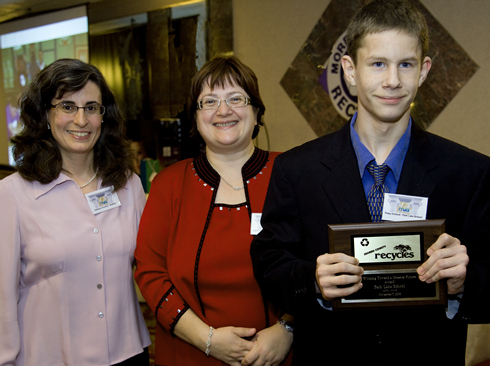 Working Toward a Greener Future Award – Park Lake School
Working Toward a Greener Future Award – Park Lake School
“The students are making the connection between the school and the larger community as they learn about various environmental matters,” said Elizabeth Pentz, educational supervisor at Park Lake School in Rockaway Borough. “We realized that it is critical for our special needs kids (ages 3-15) to be familiar with recycling,” offered Principal Sheryl Kaufman, Ed.D.,
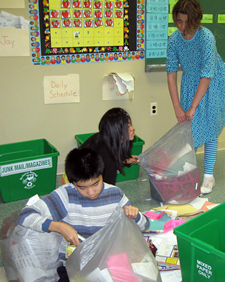 who also admitted she’s become more conscientious about recycling at
home because of what’s occurred at the school. Rockaway Borough
provided recycling containers to the school, MCMUA Recycling Specialist
Liz Sweedy visited to explain how recycling works, and an assembly
program featuring live animals who fare much better if their habitats
aren’t damaged by human activity, was given. All of this was related to
the development of a vocational life skills program. The students are
taught how to recycle bottles, cans and paper in the classrooms and
elsewhere at the school. Some of them read local newspapers and then
prepare those newspapers to go to the Rockaway Borough Recycling
Center. Every Friday, students load recyclables onto a school bus and
make the trip to the recycling center where they unload them and put
them into the proper containers. In doing so, they’re acquiring
valuable occupational skills.
“The kids realize they’re making a difference in their school because
they’re doing something good,” remarked Stacy Gebbia, a teacher.
who also admitted she’s become more conscientious about recycling at
home because of what’s occurred at the school. Rockaway Borough
provided recycling containers to the school, MCMUA Recycling Specialist
Liz Sweedy visited to explain how recycling works, and an assembly
program featuring live animals who fare much better if their habitats
aren’t damaged by human activity, was given. All of this was related to
the development of a vocational life skills program. The students are
taught how to recycle bottles, cans and paper in the classrooms and
elsewhere at the school. Some of them read local newspapers and then
prepare those newspapers to go to the Rockaway Borough Recycling
Center. Every Friday, students load recyclables onto a school bus and
make the trip to the recycling center where they unload them and put
them into the proper containers. In doing so, they’re acquiring
valuable occupational skills.
“The kids realize they’re making a difference in their school because
they’re doing something good,” remarked Stacy Gebbia, a teacher.
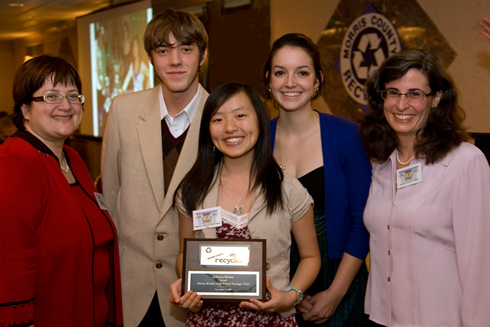 Collective Wisdom Award – Morris Knolls High School Ecology Club
Collective Wisdom Award – Morris Knolls High School Ecology Club
“Our mission is to save the world!” is the hue and cry of members of the
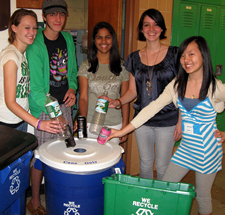 Morris Knolls High School Ecology Club. Located in Denville, Morris
Knolls is a regional high school serving 1,600 students from Denville
and Rockaway Township. A few years ago, the 40-member club established
a goal of stopping the stream of waste paper generated at the school
from being sent to the landfill. Because there was no money available
for purchasing recycling containers, the students devised a fund-raising
Morris Knolls High School Ecology Club. Located in Denville, Morris
Knolls is a regional high school serving 1,600 students from Denville
and Rockaway Township. A few years ago, the 40-member club established
a goal of stopping the stream of waste paper generated at the school
from being sent to the landfill. Because there was no money available
for purchasing recycling containers, the students devised a fund-raising
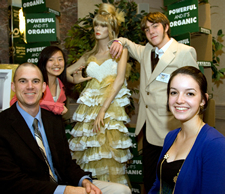 program, which included selling home-baked goods and collecting used
inkjet and laser printer cartridges from students, faculty and staff
(Cartridge World of Rockaway supplied the club with a collection box and
also purchased the cartridges.
They earned enough money to buy recycling
receptacles. Club members also met with Steve Ternosky, supervisor of
buildings and grounds, to map a collection plan. Phil Kirby, a special
education teacher who introduces students to various vocations, played a
role too, for he realized the importance of involving the students in
recycling (shades of Park Lake School). As a result, the students empty
the contents of recycling receptacles located throughout the school into
larger containers, after which the custodians deliver the recyclables to
the Denville Recycling Center. Clearly, by applying its “collective”
wisdom, the Morris Knolls High School Ecology Club is on the way to
saving the world.
program, which included selling home-baked goods and collecting used
inkjet and laser printer cartridges from students, faculty and staff
(Cartridge World of Rockaway supplied the club with a collection box and
also purchased the cartridges.
They earned enough money to buy recycling
receptacles. Club members also met with Steve Ternosky, supervisor of
buildings and grounds, to map a collection plan. Phil Kirby, a special
education teacher who introduces students to various vocations, played a
role too, for he realized the importance of involving the students in
recycling (shades of Park Lake School). As a result, the students empty
the contents of recycling receptacles located throughout the school into
larger containers, after which the custodians deliver the recyclables to
the Denville Recycling Center. Clearly, by applying its “collective”
wisdom, the Morris Knolls High School Ecology Club is on the way to
saving the world.
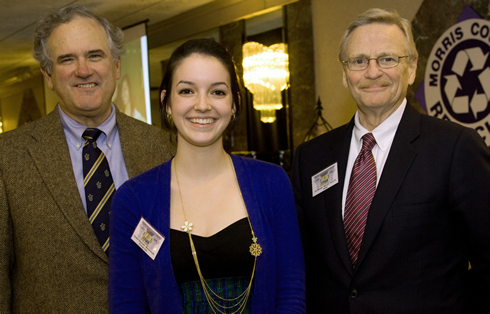 Presentation
of the Maraziti, Falcon & Healey Environmental Excellence Scholarship to
Cynthia Onorevele, President of the Morris Knolls High School Ecology
Club
Presentation
of the Maraziti, Falcon & Healey Environmental Excellence Scholarship to
Cynthia Onorevele, President of the Morris Knolls High School Ecology
Club
Eric Mindrebo, a science teacher at Morris Knolls High School and advisor to the ecology club, wrote the following in a letter
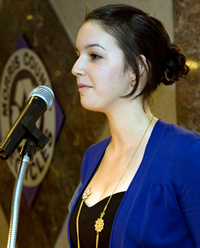 recommending Cynthia for acceptance by the Governor’s School on the
Environment: “Through her leadership, this club has blossomed into a
group of students who are bonded by their love of the environment, and
Cynthia has provided them with opportunities to have an impact on the
school and the world around them.” Cynthia was selected to attend and
did attend the Governor’s School on the Environment.
recommending Cynthia for acceptance by the Governor’s School on the
Environment: “Through her leadership, this club has blossomed into a
group of students who are bonded by their love of the environment, and
Cynthia has provided them with opportunities to have an impact on the
school and the world around them.” Cynthia was selected to attend and
did attend the Governor’s School on the Environment.
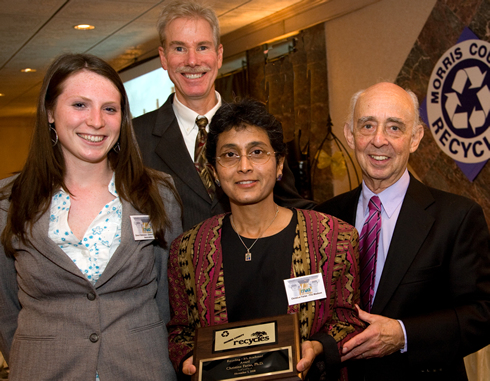 Recycling – It’s Academic! Award – Christine Farias, Ph.D.
Recycling – It’s Academic! Award – Christine Farias, Ph.D.
“Why aren’t there recycling bins on the Fairleigh Dickinson University (FDU) campus?” is the question Dana Patterson asked Dr. Christine Farias, her microeconomics instructor. Ever since they wrestled with that question, Dana says Christine has been the number one change agent on the campus. First she rounded up a group of students to form the Green Club. Then she researched where the trash was going, why recycling wasn’t happening, and what measures should be taken to make recycling a reality. At the same time, with approval from the administration, she entered FDU into Recyclemania, a nation-wide recycling contest open to colleges and universities. Later, after she was appalled by witnessing the huge quantities of perfectly good, new and used items that had been
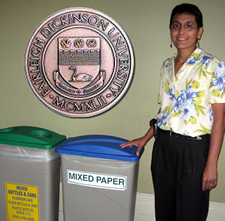 put into the trash during Move-Out Weeks, Christine developed a
collection/reuse system for such items. Now, during the last two weeks
of the semester, boxes labeled for different items are located in the
dorms. After students fill the boxes, the contents are put into PODS
(large storage containers), and then non-profit organizations such as
American Red Cross, Goodwill Industries, Salvation Army, and local
shelters avail themselves of the material, thus preventing it from being
landfilled. At the same time she was involved in these endeavors,
Christine advised the Green Club, which sponsored two viewings of the
documentary An
Inconvenient Truth, conducted campus clean-ups, staffed
information tables at Earth Day events, and more. “My main focus has
been raising consciousness,” affirmed Christine, “and right now I’m
dreaming of an on-campus rummage sale.” This from a woman with a Ph.D.
in environmental economics and a dissertation on deforestation and the
carbon sink value of forests.
put into the trash during Move-Out Weeks, Christine developed a
collection/reuse system for such items. Now, during the last two weeks
of the semester, boxes labeled for different items are located in the
dorms. After students fill the boxes, the contents are put into PODS
(large storage containers), and then non-profit organizations such as
American Red Cross, Goodwill Industries, Salvation Army, and local
shelters avail themselves of the material, thus preventing it from being
landfilled. At the same time she was involved in these endeavors,
Christine advised the Green Club, which sponsored two viewings of the
documentary An
Inconvenient Truth, conducted campus clean-ups, staffed
information tables at Earth Day events, and more. “My main focus has
been raising consciousness,” affirmed Christine, “and right now I’m
dreaming of an on-campus rummage sale.” This from a woman with a Ph.D.
in environmental economics and a dissertation on deforestation and the
carbon sink value of forests.
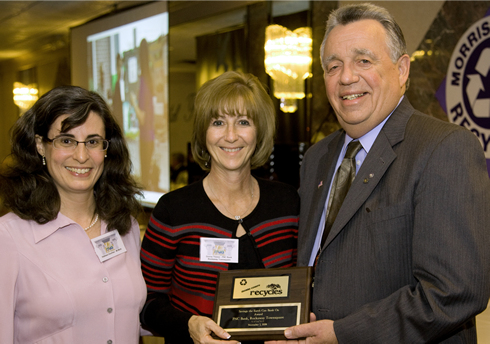 Savings The Earth Can Bank On Award – PNC Bank, Rockaway Townsquare
Savings The Earth Can Bank On Award – PNC Bank, Rockaway Townsquare
“Our event was extremely successful,” exulted Donna Theese, vice president of PNC Bank, Rockaway Townsquare, referring to a spring “green” festival held in late April and early May 2008. At the festival, the bank provided lots of information about ways to help the planet, as well as information on the very “green” building its customers were visiting. Award-winning Earth Day artwork from the Rockaway Township Public School District was also on display at the bank when the festival was in progress. According to Donna, PNC is the first
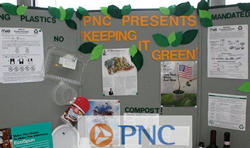 and only U.S. bank to design and build “green” branches, and it has more
certified “green” buildings than any other company in the industry. She
touts the virtues of “greenness”: lower costs, increased efficiency and
improved health in the communities where the branches are. Herewith a
list of some of the features in PNC’s “green” buildings:
and only U.S. bank to design and build “green” branches, and it has more
certified “green” buildings than any other company in the industry. She
touts the virtues of “greenness”: lower costs, increased efficiency and
improved health in the communities where the branches are. Herewith a
list of some of the features in PNC’s “green” buildings:
-
Plywood for the roof is from managed forests in which multiple trees are planted for each one that’s cut down.
-
Heating and air conditioning systems are designed to use nearly half the electricity of conventional systems.
-
The exterior glass system is four times more efficient than conventional glass.
-
The paints and glues used in the construction do not contribute to greenhouse gas emissions.
-
Selected exterior plants require half the water normally used for landscaping.
-
Pre-manufactured exterior panels reduce the construction waste.
-
All metal panels on the roof, as well as the steel structure of the building and fabric and carpet are made from recycled material.
-
All furniture is made from recycled materials....
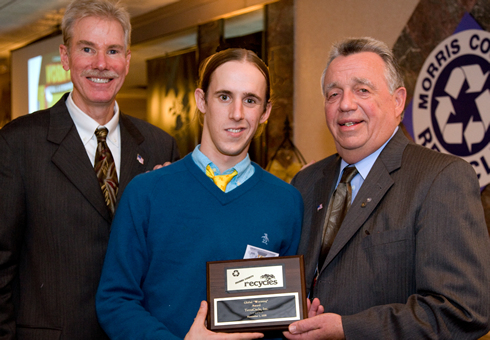 Global
“Worming” Award – TerraCycle, Inc.
Global
“Worming” Award – TerraCycle, Inc.
“We’re recycling the Earth’s own materials; that’s why our name is TerraCycle,” explained Albe Zakes, vice president of media relations. A bit of history. In the fall of 2001, Princeton University students Tom Szaky and Jon Beyer co-founded TerraCycle in Room 82 at Blair Hall, a dormitory. The two men wanted to process waste and turn it into a useful product; thus, their plant food made from worm poop and trash was born. The plant food was and continues to be bottled in previously used plastic bottles (please see the bottles of plant food on your dinner table). Tom left Princeton
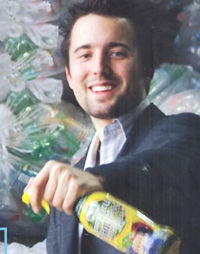 during his sophomore year in order to devote more time to TerraCycle;
he’s currently the chief executive officer of the company. At different
times between 2001 and 2008, TerraCycle expanded its line of products.
Note the green flower pot in the center of your table; it’s a TerraCycle
product made in the U.S.A. of plastic from computers and other business
equipment that otherwise would have ended up in a landfill. Urban
artists paint the flower pots. Then there are accessories such as tote
bags and messenger bags made from juice pouches and cookie wrappers
(surely you’ll recall seeing at least one of these creations in this
evening’s fashion sh`ow). Interestingly, Kraft Foods, which is
headquartered in East Hanover, N.J., has sent overruns and misprinted
and discontinued goods to TerraCycle to be used in its products. And
though there isn’t one at “The Golden Age of Recycling,” TerraCycle
“repurposes” Kendall-Jackson’s cast-off oak wine barrels into rain
barrels. “‘We became the world’s first company to make everything out
of trash’ Mr. Szaky said”
(The New York Times,
May 21, 2008). And aren’t we glad!
during his sophomore year in order to devote more time to TerraCycle;
he’s currently the chief executive officer of the company. At different
times between 2001 and 2008, TerraCycle expanded its line of products.
Note the green flower pot in the center of your table; it’s a TerraCycle
product made in the U.S.A. of plastic from computers and other business
equipment that otherwise would have ended up in a landfill. Urban
artists paint the flower pots. Then there are accessories such as tote
bags and messenger bags made from juice pouches and cookie wrappers
(surely you’ll recall seeing at least one of these creations in this
evening’s fashion sh`ow). Interestingly, Kraft Foods, which is
headquartered in East Hanover, N.J., has sent overruns and misprinted
and discontinued goods to TerraCycle to be used in its products. And
though there isn’t one at “The Golden Age of Recycling,” TerraCycle
“repurposes” Kendall-Jackson’s cast-off oak wine barrels into rain
barrels. “‘We became the world’s first company to make everything out
of trash’ Mr. Szaky said”
(The New York Times,
May 21, 2008). And aren’t we glad!
 From
Carnegie Hall to the Hanover Manor – the concert pianist’s gown, a very
special guest - On Tuesday, February 19, 2008,
Julliard-trained concert pianist Soyeon Lee made her Carnegie Hall debut
wearing a gown made from more than 5,000 Honest Kids? Goodness Grapeness
drink pouches. Interestingly, the title of Ms. Lee’s performance was “Re!nvented.”
TerraCycle commissioned eco-designer Nina Valenti to create the gown.
Ms. Valenti stitched together square panels cut from the drink pouches
From
Carnegie Hall to the Hanover Manor – the concert pianist’s gown, a very
special guest - On Tuesday, February 19, 2008,
Julliard-trained concert pianist Soyeon Lee made her Carnegie Hall debut
wearing a gown made from more than 5,000 Honest Kids? Goodness Grapeness
drink pouches. Interestingly, the title of Ms. Lee’s performance was “Re!nvented.”
TerraCycle commissioned eco-designer Nina Valenti to create the gown.
Ms. Valenti stitched together square panels cut from the drink pouches
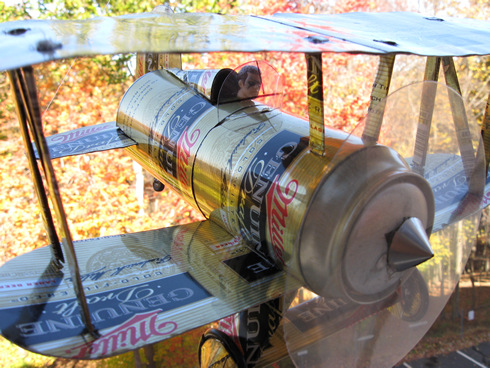 into “a strapless gown with elaborate layers and wings” (The
New York Times, February 14, 2008). Underneath all those juice
pouches is a silk taffeta lining. For more information about
TerraCycle’s collection program for drink pouches and other items, visit
www.terracycle.net/brigades.
Recycling flies high on the golden anniversary of the MCMUA
into “a strapless gown with elaborate layers and wings” (The
New York Times, February 14, 2008). Underneath all those juice
pouches is a silk taffeta lining. For more information about
TerraCycle’s collection program for drink pouches and other items, visit
www.terracycle.net/brigades.
Recycling flies high on the golden anniversary of the MCMUA
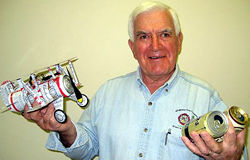 Of course it
does. Chances are, though, that recycling will fly even higher over the
Of course it
does. Chances are, though, that recycling will fly even higher over the
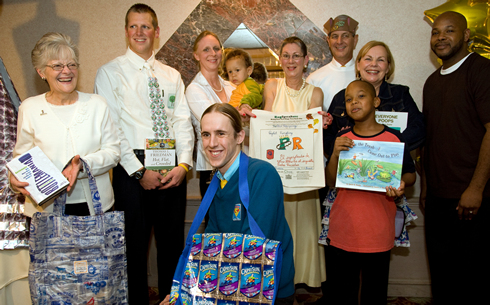 next few years. To give that idea a boost, Hanover Township resident
John Keena has created a “golden” airplane for the MCMUA from some used
aluminum beverage cans. How very fitting, for John was a pilot not so
long ago.
The fashion
show
next few years. To give that idea a boost, Hanover Township resident
John Keena has created a “golden” airplane for the MCMUA from some used
aluminum beverage cans. How very fitting, for John was a pilot not so
long ago.
The fashion
show
The following models grace the runway this year: Albert Lance Carpenter (he flew in from Dallas, Texas, to represent Frisco, his hometown, which has an award-winning recycling program), Glinda Garbahj, Brian Jacobus, Soyeon Lee, Tomas Monteiro, Helen O’Keefe, Solweig von Minden, Fred Wilson and Myles Wilson. The mannequin
Miranda McMua, named in part for the character whom Cynthia Nixon portrayed on an HBO show about life in New York City, once again is delighted
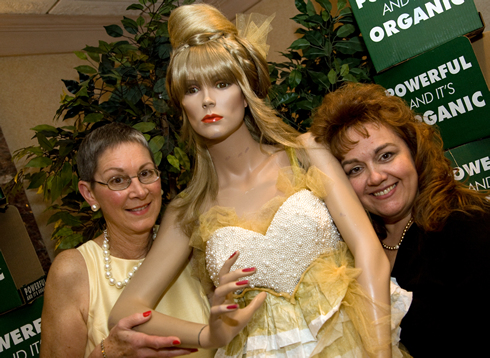 to attend a recycling awards dinner.
Leeza Tea Coco Chanel, MCMUA designer in residence, has transformed a
consignment store find into a gorgeous golden gown for Miranda by adding
a cascading overlay of
to attend a recycling awards dinner.
Leeza Tea Coco Chanel, MCMUA designer in residence, has transformed a
consignment store find into a gorgeous golden gown for Miranda by adding
a cascading overlay of 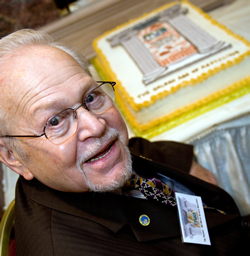 crinkled toilet tissue wrappers and tulle.
The cake - Seventeen large sheet cakes in a row. Add
this year’s cake and that makes 18, the number baked by MCMUA member
Herman (“Hy”) Nadel, aka the Cake Man, for our dinners. Kudos to Hy for
replicating those pillars!
The table
favors and door prizes
crinkled toilet tissue wrappers and tulle.
The cake - Seventeen large sheet cakes in a row. Add
this year’s cake and that makes 18, the number baked by MCMUA member
Herman (“Hy”) Nadel, aka the Cake Man, for our dinners. Kudos to Hy for
replicating those pillars!
The table
favors and door prizes
Thanks to TerraCycle for donating quite a few of the bottles of plant food, and thanks also to the following donors of door prizes: Atlantic Coast Fibers, Inc.; Green Sky Industries, Inc.; Rainbow Promotions; Reliable Wood Products/Reliable Paper Recycling; and Nature’s Choice. The musicians - For the 14th consecutive year, Shot of Redemption is providing live music. To book them for an event, call 845-255-3177.
